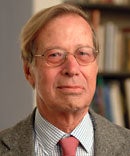Legal philosopher Ronald Dworkin LL.B. ’57 received an honorary Doctor of Laws degree from Harvard University during the 358th Commencement Exercises in Tercentenary Theater on June 4.
A native of Worcester, Mass., where he was born in 1931, Dworkin is a professor of jurisprudence at both University College London and the New York University School of Law. He previously taught jurisprudence at both Yale University (1962-69) and the University of Oxford (1969-98).
Dworkin, a former Rhodes Scholar, studied at Magdalen College, Oxford, where he was a student of legal scholar Rupert Cross.
After law school at Harvard, Dworkin clerked on the 2nd U.S. Circuit Court of Appeals for Judge Learned Hand. Hand later called Dworkin the best law clerk he had ever employed. In turn, Dworkin regards Hand as a deeply influential mentor.
Before moving on to Yale in 1962, Dworkin was associated with the prestigious international New York law firm Sullivan & Cromwell. He is the author of eight books, starting with “Taking Rights Seriously” in 1977, and editor of three others.
In the realm of legal philosophy, Dworkin is known for his contributions to liberal theory. Most controversial is his “right answer thesis,” the notion that there is only one right answer in most legal cases.
“Taking Rights Seriously,” considered a landmark text in the philosophy of law, builds a case against legal positivism, the idea that there’s no inherent connection between law and morality. Dworkin argued that the rights of the individual exist outside the law itself, and in fact come before the interests of the majority.
In “Sovereign Virtue” (2000), Dworkin proposed his “equality of resources” theory. It’s based on two ideas. For one, humans are responsible for the choices they make in life. And for another, intelligence and talent are “morally arbitrary” – and therefore should not affect how concern, respect, and resources are distributed within a society.
Dworkin is a longtime contributor to The New York Review of Books, where he has written a wide range of commentaries and reviews on legal, political, and cultural matters.
Dworkin joins a prestigious group of individuals who have received honorary doctor of law degrees from Harvard, including John F. Kennedy, Dwight Eisenhower, Frankin Delano Roosevelt, Winston Churchill, Nelson Mandela, Kofi Annan, and leading scholars like John Rawls and Jurgen Habermas.
